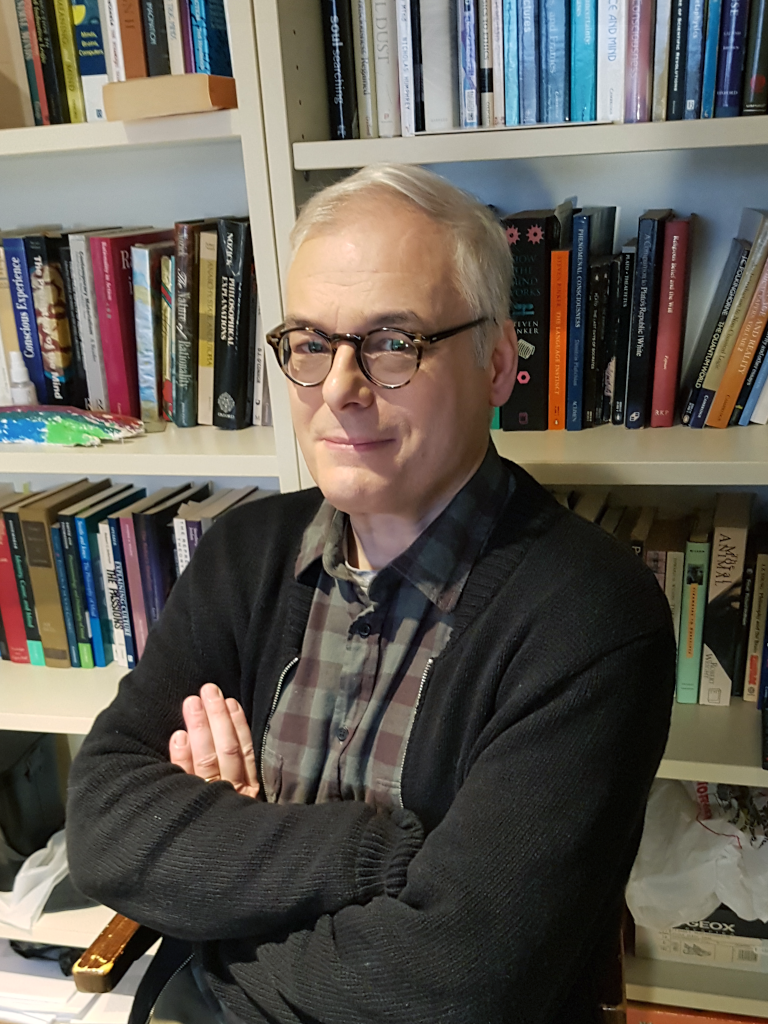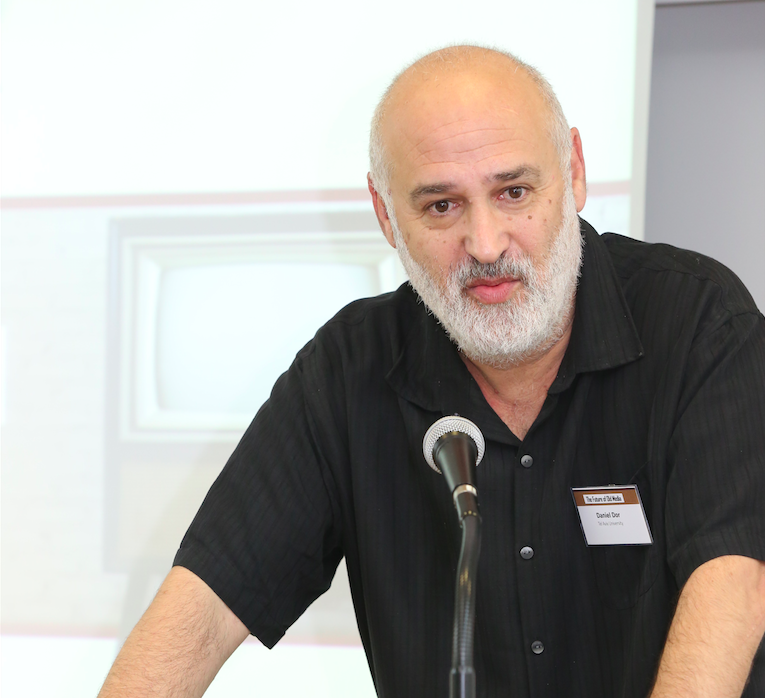Did the Human Mind Originate in Telling Ourselves Stories?
A philosopher and writer tries to account for the jump from animal to human by wholly natural means
Philosopher and writer Keith Frankish (pictured), who has edited many books about consciousness and written a few as well, sets himself a formidable task: to explain how the human mind originated. He starts by setting limits as to where he will look for ideas:
Like all other animals, our species evolved by gradual processes of natural selection that equipped us to survive and reproduce within a certain environmental niche. Unlike other animals, however, our species managed to escape its inherited biological role and take control of its own destiny. It began to innovate, actively reshaping its way of life, its environment and, eventually, the planet itself. How did we do it? What set our species, Homo sapiens, apart from the rest?
Keith Frankish, “Our greatest invention was the invention of invention itself” at Psyche (June 24, 2020)
On his terms, consciousness must arise by wholly natural means. Behind the nature in which it arises, there is nothing, no consciousness, no mind that could play a role. There is nothing.
So, to be clear, humans are just animals in his view. And therefore — we will return to this — his thesis about how human consciousness originated must be judged by its viability according to that standard.
In his telling, for over 1.5 million years, human animals slowly diverged from great apes. We began humanizing (?) about 300,000 years ago. While he thinks that something must have happened between 40,000 and 60,000 years ago, he wisely cautions against pointing to any specific event as the cause (see Note below).
Frankish does, however, have a theory by which he hopes to account for many events: the development of hypothetical thinking, “the ability to detach one’s mind from the here and now, and consciously think about other possibilities.” That, he argues is “the key to sustained innovation and creativity, and to the development of art, science and technology.” Apart from such thinking, one would live merely in the present, as animals do, unable to contemplate new ideas.
To develop his own ideas, he synthesizes the views on consciousness of linguist Daniel Dor, as represented in The Instruction of Imagination (2015), and philosopher Daniel Dennett, as represented in Consciousness Explained (1991).

Dor (pictured) argues that early humans learned to convey information to others about things that those others did not directly experience as follows:
The trick was to take the sound or gesture already associated with a thing and use it in a new way – not as an invitation to experience the thing, but as an instruction to imagine it. When a speaker made the ‘wolf’ sound when no wolf was present, their hearers drew on their memories of wolves to imagine a wolf somewhere out of sight. If the speaker added the sound for ‘hill’, their hearers combined memories of wolves and hills to imagine a wolf on the hill, and reacted accordingly. With this, communication was released from the here and now. As Dor puts it, a Rubicon was crossed: ‘For the first time in the evolution of life, humans began to experience for others, and let others experience for them.’ This was the birth of language.
Over time, Dor explains, humans gradually improved this new technology of communication. They mutually identified new signs for things important to them, creating a ‘symbolic landscape’ that carved up the experienced world into discrete features, and they settled on conventions for linking signs together in ways that indicated the relations between the features specified. (These conventions weren’t explicitly agreed, of course; they developed tacitly, as social conventions often do.)
Keith Frankish, “Our greatest invention was the invention of invention itself” at Psyche (June 24, 2020)
A question naturally arises. But first let’s hear what Daniel Dennett thinks. Dennett is well known for regarding consciousness as an illusion:
In brief, the idea is this. Once they developed language, our ancestors would sometimes talk to themselves, at first by accident. And when they did, they would hear their own utterances and, often, react to them as they did to other people’s. When they asked themselves a question, they answered; when they admonished themselves, they worked harder; when they reminded themselves, they focused more, and so on – these reactions being generated spontaneously by non-conscious processes. Sometimes, one utterance would provoke another, and that another, and so on, generating a lengthy train of thought. This process of mental self-stimulation helped to coordinate the resources of different brain systems, and it proved useful, enhancing self-control and promoting sustained patterns of behaviour. Humans formed habits of private speech and gradually developed the ability to talk to themselves silently in inner speech. They also adopted other forms of mental self-stimulation, such as drawing pictures or visualising them. Elaborated and refined, the stream of self-generated speech and other imagery, and the associated mental reactions, came to form what we call the conscious mind.
Keith Frankish, “Our greatest invention was the invention of invention itself” at Psyche (June 24, 2020)
Frankish thinks that Dennett’s “suggestion” fits nicely with Dor’s:
As they cultivated these habits, mentally stimulating themselves and paying careful attention to the results, humans did something else, too. They created the sense that there was a private world inside them, where their real self lived and thought, a world that sometimes seemed more real to them than the one around them. In a sense, they created their own conscious minds and selves.
Keith Frankish, “Our greatest invention was the invention of invention itself” at Psyche (June 24, 2020)
That nagging question, noted earlier, comes back, along with several others:
➤ First, why did this series of convenient, stepwise events—if they were so natural—not happen to chimpanzees and numerous other mammals? If the answer is, “No particular reason,” we must ask, “Then what reason have we to believe that it happened this way with humans?”
Generally speaking, when the same type of event happens to a number of different types of life forms, we can identify a pattern and try to interpret causes. In this case, we are expected to accept routine natural causes for an obviously unique and world-changing event.
➤ Here’s a much bigger problem: “When a speaker made the ‘wolf’ sound when no wolf was present, their hearers drew on their memories of wolves to imagine a wolf somewhere out of sight.” (Dor) “Once they developed language, our ancestors would sometimes talk to themselves, at first by accident. And when they did, they would hear their own utterances and, often, react to them as they did to other people’s. ” (Dennett)
How did the hearers “imagine” anything? And “language”? Where did they get language, which is full of abstractions? In fact, to talk to oneself, as Frankish suggests, following Dennett, one constantly makes use of abstractions. Abstractions are a critical part of the very mental endowment whose origin we are trying to explain. So this origin of consciousness story turns out to be hopelessly circular. Of course, if we already have consciousness, we can always generate more of it. But we can’t generate a credible account of the origin of consciousness that way.
This problem is pervasive. Earlier, Frankish explained that Dennett accounts for consciousness as “a temporary level of organisation—a ‘virtual system’—that we create for ourselves through certain learned habits of self-stimulation.” But what are the concepts “we,” “ourselves,” and “self-” even doing in this discussion? If consciousness is an illusion, these concepts are illusions that cannot create anything.
Consciousness, as philosophers agree, is a Hard Problem. For one thing, it is not a material entity. No theory that attempts to reduce it to a material entity is likely to be much use. But we can be sure that many materialists will continue to try.
Note: Many analysts have not avoided the trap of trying to identify a single event. For example, a list I compiled a few years ago included the following hypotheses, seriously advanced:
Human evolution is said to be driven by art, cooking, sexual selection, and/or baby slings. Cooking, in particular, made digestion easier and freed up the extra energy our ancestors needed to grow bigger brains,” maybe spurring evolution by cooking meat. Others say that eating fish and reptiles made the difference. Fluctuating environment gets a mention.
We are told that but for fresh pastures, “we would never have loosened up enough to learn to speak” (like cows do?) Also that baby apes’ arm-waving or monkey lip-smacking provide insight into how humans acquired language. Fatherhood, others tell us, made us human because “A father who recognized his son in a neighboring group would be less likely to strike out against him, which would open the way for larger tribal networks.” But, according to other sources, early man ate children (which might somewhat reduce the sense of child loyalty?), depending on who you ask, or else he ate grandma —or would have except that she looked after the children (provided he didn’t eat them first, one presumes).
Denyse O’Leary, “Why Human Evolution Happened Only Once: The Question No One Has to Answer” at Evolution News and Science Today: (June 9, 2014)
You may also enjoy:
Has science shown that consciousness is only an illusion? Using clever analogies, Philosopher Daniel Dennett argues that consciousness is all smoke and mirrors (Denyse O’Leary)
and
Neuroscientist Michael Graziano should meet the p-zombie. To understand consciousness, we need to establish what it is not before we create any more new theories. (Michael Egnor)
